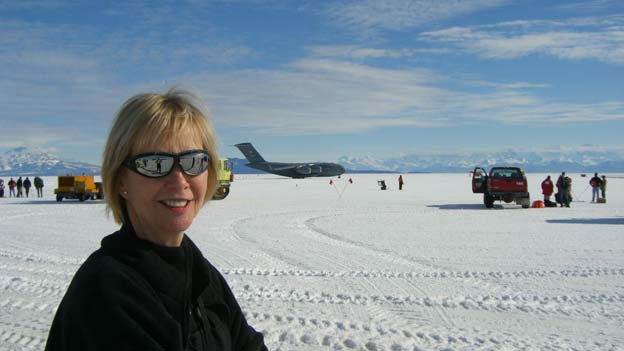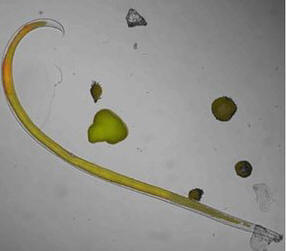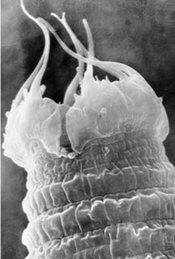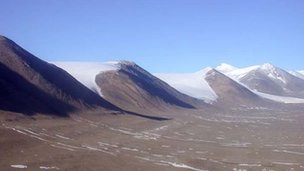Antarctic nematodes and climate change

Diana Wall, Colorado State University School of Global Environmental Sustainability, in Antartica
Climate change affects not only air temperature and sea levels, but soil as well. And an American scientist is on an award-winning quest to reverse the damage.
The frozen desert valleys of Antarctica are among the world's most inhospitable environments. The landscape is so barren that just 30 years ago, experts did not think it could support life.
But beneath the surface, microscopic worms called nematodes thrive in a unique ecosystem - and they are helping researchers understand the effects of climate change.
Soil scientist Diana Wall has spent two decades studying Antarctic nematodes, ground-breaking work that this year earned her one of science's top awards - the Tyler Prize for Environmental Achievement.
"Antarctica is pretty fantastic," she says. "I can only equate it to what it must be like on Mars. There's just nothing there.
"The first thing I always notice is the silence - unless the wind is blowing. There are no birds. Nothing moves, and you see no green."
All life is hidden in the soil, under frozen lakes or in meltwater streams that run just a few weeks a year.
To work in such harsh conditions, the 69-year-old director of Colorado State University's School of Global Environmental Sustainability must pass tough physical tests and train daily to keep fit.
"I'm used to it now but I don't take it for granted," she says. "As I tell my students, people die here."
But that harshness makes Antarctica the perfect outdoor laboratory for testing theories about the relationship between the earth's climate and the creatures that live in the soil.
Nematodes and bacteria capture and store carbon that otherwise contributes to global warming when allowed to overload the atmosphere in the form of carbon dioxide gas.
A handful of dry soil in most other regions would contain millions of organisms, making the soil difficult to study. But in the Antarctic there is just one - Scottnema lindsayae.
The ability to isolate the single organism makes possible the study of the environment's role in its life cycle.
"I call it the Rambo," says Dr Wall. "It's not ugly, but it's a really tough-looking nematode."
But Rambo is on the ropes. As temperatures rise and more ice melts, another nematode that thrives in wet soil, Eudorylaimus glacialis, is moving in. And as the two species slug it out for Antarctic dominance, Rambo appears to be losing, declining 65% in the last few years.
That could prove a problem. Scottnema is a great carbon hoarder, and if its population is waning in Antarctica, Dr Wall theorises a similar calamity may be striking other important nematode species around the globe, potentially contributing to climate change.
She calls for soil conservation and restoration policies.
"We take soil for granted, but we need to pay more attention to it," she says.
"Soil needs to be managed very carefully, just as we do our oceans, the water we drink and the air that we breathe."
The Tyler Award recognizes the contribution of Dr Wall's work to the climate change debate and how it has raised awareness of an area of science that has often lacked the popular appeal of ocean conservation and space exploration.


In a battle of the nematodes, Eudorylaimus glacialis (left), threatens Scottnema lindsayae (right).
"It can be a pretty hard sell," says David Wolfe, a professor of plant and soil ecology at Cornell College of Agriculture and Life Sciences.
"Diana deserves a lot of credit. In addition to being one of the major soil biologists of our time, she's also made sure that the information is getting out."
Soil has become sexier in part because advances in molecular biology and deep earth ecology have enabled scientists to discover new life forms far below the surface of the earth.

In Antarctica's desert valleys, life is hidden in the soil
"Soils are a huge global reservoir of carbon - the equivalent of the amount of carbon you would find in plants and more than the amount found in the atmosphere," says Patrick Megonigal, deputy director of the Smithsonian Environmental Research Center.
"We're beginning to understand that climate changes - changes in temperature, plant activity, rainfall - all effect the soil's carbon reservoir," he says. "The way we manage soils can either mobilise that carbon back into the atmosphere and contribute to greenhouse gasses - or work the other way."
Dr Wall's research has already contributed to US and European efforts to protect soil and address climate change. Scientists agree that government policy is critical to halting soil erosion, limiting loss from urbanisation and supporting sustainable agriculture.
Action may come too late to save Scottnema - the Rambo nematode of Antarctica - but other soil organisms that form the most complex food system on the planet may depend upon it.